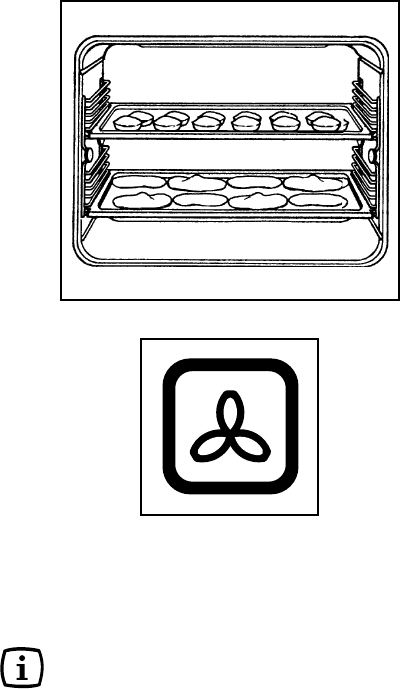
10
The Fan Oven
The air inside the oven is heated by the element around
the fan situated behind the back panel. The fan circulates
hot air to maintain an even temperature inside the oven.
The advantages of cooking with this function are:
l
Faster Preheating
As the fan oven quickly reaches temperature, it is not
usually necessary to preheat the oven although you
may find that you need to allow an extra 5-7 minutes
on cooking times. For recipes which require higher
temperatures, best results are achieved if the oven
is preheated first, e.g. bread, pastries, scones,
souffles, etc.
l
Lower Temperatures
Fan oven cooking generally requires lower
temperatures than conventional cooking.
Follow the temperatures recommended in the chart
at page 18. Remember to reduce temperatures by
about 20-25°C for your own recipes which use
conventional cooking.
l
Even Heating for Baking
The fan oven has uniform heating on all runner
positions. This means that batches of the same food
can be cooked in the oven at the same time.
However, the top shelf may brown slightly quicker
than the lower one.
This is quite usual. There is no mixing of flavours
between dishes.
How to use the Fan Oven
1. Switch the oven on.
2. Press the Oven Function Control button once.
3. If necessary adjust temperature setting using
the "Increase" or "Decrease" buttons.
THINGS TO NOTE
l
The oven light will come on when the oven is switched
on.
l
The cooling fan will operate continually during cooking.
It may run on after the oven is switched off to keep
the controls cool. This is quite normal.
NOTE
The action of the cooling fan will depend on how long the
oven has been used and at what temperature. It may not
switch on at all at lower temperature settings nor run on
where the oven has only been used for a short time.
FO 2079
F
FAN OVEN FUNCTION SYMBOL
PRE-SET TEMPERATURE: 175°C
TEMPERATURE SELECTION: 50°C - 250°C
Hints and Tips
Runner positions are not critical, but make sure the
shelves are evenly spaced.
When cooking more than one dish in the fan oven, place
dishes centrally on the shelves rather than several dishes
on one shelf.
When the oven is full, you may need to allow a slightly
longer cooking time.
A shelf may be placed on the floor of the oven. Place
dishes on a shelf in this position rather than on the oven
base, to allow air circulation around the food.
When the oven is full of the same food, e.g. equal trays
of small cakes or equal size victoria sandwich cakes,
then they will be cooked in the same time and removed
from the oven together. When different sizes of trays or
types of food, e.g. biscuits and cakes are cooked, they
will not necessarily be ready together.
The fan oven can be used to heat foods through without
thawing first, e.g. fruit tarts, mince pies, sausage rolls,
and other small pastry items. Use a temperature of 190-
200°C and allow 20-40 minutes (depending on the quantity
of food in the oven).
The use of too high temperatures can cause uneven
browning. Check with the recommendations for oven
temperatures given in the cooking charts, but be prepared
to adjust the temperature by 10°C if necessary.
Remember to reduce temperatures by about 20-25°C for
your own conventional recipes.
The meat tin should not be placed on a heated hotplate
or burner as this may cause the enamel to crack.


















